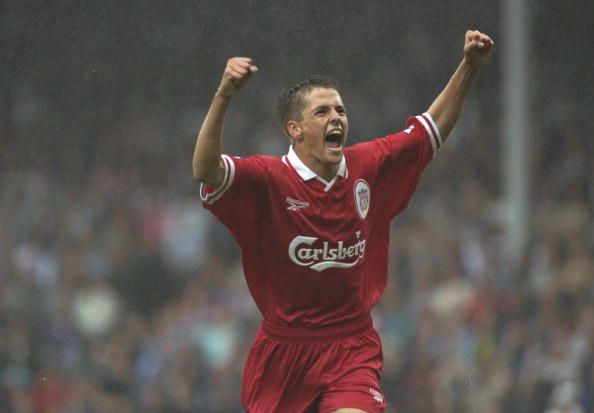
Legends of Club Football: Michael Owen
The year was 1997. The venue was Selhurst Park, London. The home ground of English football’s favourite underdogs, Wimbledon FC.
Manchester United were on the cusp of winning the 1996-97 Premier League title, after Liverpool, who led the league for most of the season, suffered a horrendous run of form to hand the initiative to United. Liverpool had to beat Wimbledon FC in the penultimate game of the season, an unenviable task made harder with the suspension of star striker Robbie Fowler.
With the home side leading 2-0 and Liverpool’s title challenge dead in the water, a 17-year-old Red substitute emerged out of nowhere to clinically score on his Liverpool debut and provide one last faint glimmer of hope to the travelling supporters. Despite running circles around the home defence, his one-man efforts would go in vain, as Liverpool would lose 2-1 and concede the league to United.
The boy’s name was Michael Owen.
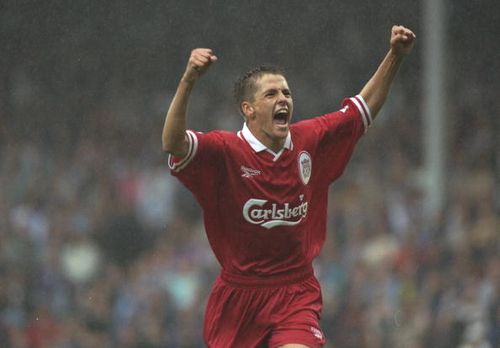
A glorious debut for the Chester-born youngster, who earned universal praise from every nook and corner for his efforts.
The Liverpool Echo said, “Only Michael Owen could emerge with any credit from a performance that mocked Anfield’s rich traditions. It was a debut marked in a grand manner.”
Exploding at the speed of a bullet train, Owen would dominate defenders of all ages and sizes in the coming season, solidifying his starting berth during Fowler’s absence through injury. Exceeding all expectations, Owen used his electrifying pace, supernatural movement, and clinical eye to bamboozle even the best of defenders like the great Tony Adams himself.
Here was a mere 5’7″ 18-year-old rookie tearing down defenders twice his size, in one of the world’s most physical leagues. Breaking numerous records in the process, Owen won the Golden Boot and the PFA Young Player of the Year awards. At that time, Owen had become his country’s youngest ever player, and went into the 1998 FIFA World Cup in France with colossal expectations on his young shoulders. Comparisons were being made world over to legendary English finishers such as Gary Linekar, Alan Shearer and Kevin Keegan.
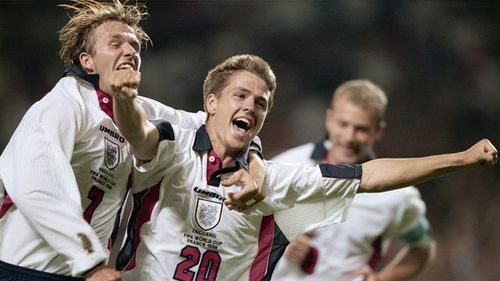
Owen celebrates after scoring against Argentina in 1998
Taking on all comers in France, Owen mesmerized the audiences against Romania and Argentina. Against Argentina in the last 16, a match infamous for David Beckham’s dismissal, Owen netted home a sensational solo goal which ultimately went in vain. Receiving the ball from Beckham at the edge of the halfway line, the youngster burst through his marker and dribbled through every next hapless defender to come his way, and found himself one-on-one with the goalkeeper Carlos Roa. Cool as a cucumber, Owen calmly smacked the ball into the side of the goal; a perfect lesson in striking efficiency, as if it was something he had been doing for years.
Owen is not your typical media-loving, fame-hungry footballer. He is a shy, mild-mannered, horse-loving, enthusiastic footballer, who focused on nothing but taking the mickey out of the world’s best defenders. Over the years, just like Thierry Henry, Owen has perfected his perfect type of goal.
“In the 18 yard box – side foot – bottom corner. Simple to the eye, hard thing to execute in a league that is so physically dominant. He obviously scored goals out the ordinary but, like Thierry Henry, the style that he had perfected was shown on a weekly basis.” – A Liverpool fan
After 1998, Owen continued his rich vein of form, winning the Golden Boot once again the following season, despite losing two months to injury. The year of 1999 was when Owen would get a glimpse of how his future would turn out. Featuring sparsely for the Reds throughout the season, Owen played only six games full games between April 1999 and January 2000.
After two wonderful years during which he captivated the entire world, the voice of the doubters was ringing clear and loud. Fans grew worried that the now 20-year-old Owen was not physically capable of sustaining his standard of play in the Premier League. Coming into the 2000-01 season, Liverpool had gone five years without a trophy. Steve McManaman had left, Steven Gerrard hadn’t broken out as yet, and Fowler’s consistency was waning.
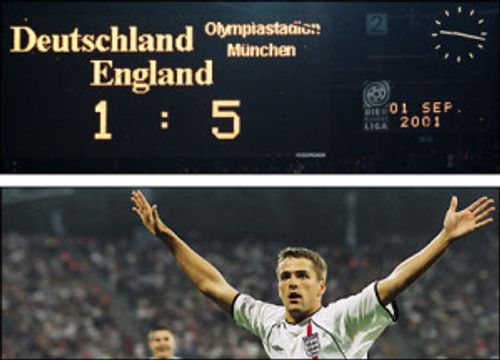
Michael Owen’s night in Munich
Coming into life that season, Owen blew away all the doubters, having his best season ever in a Red shirt. He led Liverpool to a unique ‘Treble’ of cups that season, as they won the FA Cup, the League Cup and the UEFA Cup. Owen single-handedly won the FA Cup Final for the Reds against Arsenal. Having been dominated by the Gunners for the entirety of the game and trailing 1-0 with just ten minutes left to play, Owen cropped up out of nowhere to score a double and save his side from the bowels of certain defeat against an excellent Arsenal side.
Owen in his autobiography after scoring against Arsenal, “I have to search for the right words to describe what I managed to sprint past Lee and take it to the side of Tony Adams, who was racing across to intercept… I had first run on him, and all I needed to do then was strike the ball at precisely the right moment. As the ball left my foot, I could see it heading towards the corner. Looking back, I was slightly lucky that it went over Seaman’s hand.”
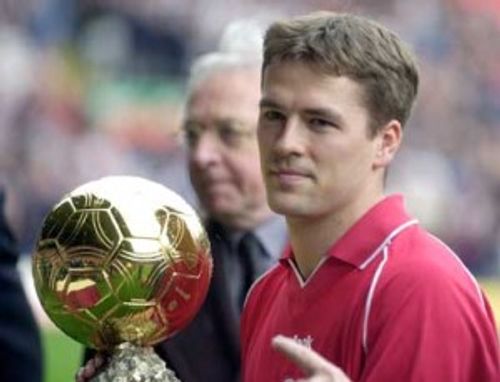
It was tipped to be the first of many
Not only did he excel for Liverpool in 2001, but he was also the architect of one of England’s most famous wins of all time. England beat Germany 5-1 in a 2002 FIFA World Cup qualifier in the Olympic Stadium in Munich, in which Owen scored a hat-trick to destroy the hapless Germans and saw England gain revenge for painful defeats against Germany in several previous tournaments. The partnership of Owen and Beckham that night was simply irresistible, ably assisted by goals from Gerrard and Emile Heskey. All the scorers for England that night were from Liverpool, the crowning moment of a historical 2001 for Owen and his club mates.
2001 was the year when Michael Owen was at the pinnacle of his footballing powers. To cap the year off, he would win the prestigious Ballon D’Or award, the first English player to win the award since fellow Liverpool legend Kevin Keegan won it in 1979, but surprisingly the 22-year-old didn’t claim the FIFA World Player of The Year award. The world was at his feet. The Liverpool supporters, both young and old idolized the boyhood wonder. They screamed his name from the terraces of Anfield.
“I feel that every time I get the ball at the moment, I am going to score.” – Michael Owen
At the peak of his powers, Owen was untouchable. England fans painted Wayne Rooney as their new hero after his emergence at Euro 2004, but make no mistake about it, Owen at his peak was far better than Rooney. Not just a one-trick pony as many would suggest, but Owen played a crucial part in assisting many goals for club and country. Equally good with either foot, Owen possessed an excellent first touch as well, which enabled him to run up behind defences and slice them open.
The comparisons to Cruyff, Pele and Maradona were gaining steam and many predicted that Owen would soon cement himself as the greatest English player of all time, and end their near 40-year drought in the FIFA World Cup. Despite failing to win either the 2002 FIFA World Cup or the Euro 2004 with England, Owen emerged from the tournaments with his name unscathed, having put in some excellent shifts for his country.
As time flew by at Anfield, despite the heroics of Owen, Liverpool only intermittently challenged for the league title, finishing second in the 2001-02 season. As rumours of his discontentment grew, Florentino Perez of Real Madrid wanted Owen to be his next ‘Galactico’. Gerard Houllier’s team was falling apart at the seams, but he recognized the importance of Owen and refused to sell him, despite the continued advances of Perez.
Houllier on Owen in 2003, “We want to win the title. This is our vision at Liverpool – and we want to win it with Michael in our team. Michael is a genuine world-class player. He has had a great season and I think he will be even better next season.”
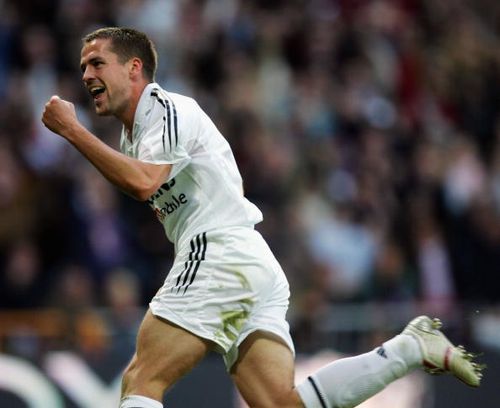
Despite all the assurances that Owen would remain at Liverpool, he departed the club at the end of the 2003-04 season, after the departure of Houllier, for just £8 million to Real Madrid, with just one year left on his contract. Antonio Nunez also came to Liverpool as a make weight in the deal. New manager Rafael Benitez wanted to construct a new team and didn’t see it fit to make room for one of the club’s greatest ever players in his plans. Their top scorer for every single season since 1998 had departed. That’s six seasons atop the scoring charts. A picture of consistency.
“There is no one better at taking chances. His positional play, first touch and finish were absolutely superb. World-class.” – Sir Alex, after Owen’s famous winner in the 4-3 derby classic against Manchester City.
Owen’s departure to Real Madrid was the catalyst for his downfall as a player. The manager at the time seemingly never wanted Owen, often playing him as a substitute, something that infuriated everybody back in England. After scoring 16 goals in 45 games, Owen left Madrid the following season, frustrated by a lack of playing time, and especially when the club saw fit to put the likes of Julio Baptista and Robinho (yes, those two!), ahead of Owen in the pecking order.
On his return to the Premier League with Newcastle, the injuries started to multiply and derail his career. Out for months at a time, Owen was seemingly unable of recapturing his best form. His woes were compounded when he tore his ACL ligament at the 2006 FIFA World Cup, something that he himself highlights as an injury he was never fully able to recover from.
The ACL injury resulted in an ugly dispute between the FA and Newcastle, something that took a heavy physical and mental toll on Owen. A vicious cycle of recurring injuries, followed by a burst of goals in the few matches that he did play, became common sight for the boyhood Everton supporter. At the end, Owen was unable to save Newcastle from relegation, and departed the club at the end of his contract, to Manchester United of all teams.
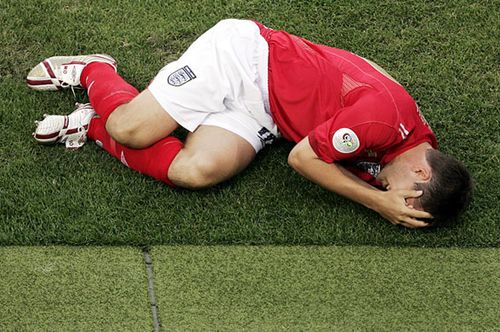
Owen’s after his ACL injury against Sweden at the 2006 FIFA World Cup
But Michael Owen was already dead. This wasn’t the same Owen who had put Germany to the sword that fateful night in Munich. This wasn’t the same Owen who was tipped to become the next Pele or Maradona. His legacy will live, but his story will be an unfortunate one that will be re-told several times over for generations to come. Owen was a player who never quite fulfilled his full potential, much like his fellow contemporary Robbie Fowler. The story of Owen also teaches clubs why they should be more careful with their young players. He had played nearly 100 games in the league alone by the time he was 21, and was heavily over-exposed by Liverpool and England.
“If a team-mate pulls his hamstring, they should call me up, I can tell them absolutely everything they need to know about that injury”- From Michael Owen’s Autobiography – Off The Record
The warning signs were there when he was 20, and reacting appropriately to it may have saved Owen’s career. The stark reality is that Owen warming the benches for three straight seasons at Old Trafford, was something that was unimaginable a decade back to both United and Liverpool fans. Owen is just 32 years old now, just about the same age as Steven Gerrard. Imagining how his career would have turned out had he stayed at Liverpool is quite tantalizing, and both Liverpool and Owen made a huge mistake in 2004.
His defection to United in 2009 was seen as the ultimate form of betrayal by the Kop. But the hearts could not hate. This was the same player that they had idolized for eight magical years. They had watched Owen become a man. He was loved deeply by the Anfield faithful, and the move to United affected the supporters far more than Fernando Torres’ defection to Chelsea ever will.
Owen will always and forever remain a Liverpool legend, one of their greatest ever.
One of England’s all-time greats.